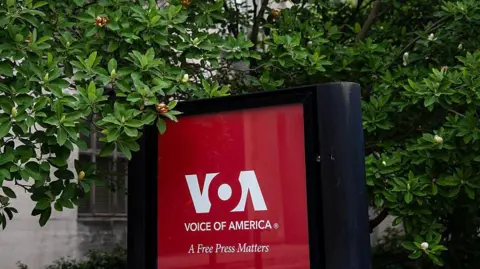Amidst the backdrop of India's tumultuous political landscape, few artists wielded their pens with as much audacity as Abu Abraham, a political cartoonist whose keen observations during the country’s Emergency era have etched his name in history. From 1975 to 1977, India faced a period of profound civil liberties suppression, which coincided with a drastic muzzling of the press ordered by Prime Minister Indira Gandhi.
One of Abu’s poignant cartoons captures a conversation between a frustrated newspaper editor and a staff member grappling with unexpected censorship: “It’s unfair to lift censorship suddenly,” he complains, illustrating the absurdity of the media landscape during that time. His art strived not just to provoke thought but to offer a level of humor amidst stark realities, notably during the dark period when dissenting voices were silenced.
Despite the government’s swift clampdown on free expression starting June 25, 1975, Abu's art refused to cower. It led with an elegant critique, famously showcasing then-President Fakhruddin Ali Ahmed signing the Emergency proclamation from his bathtub. Today, the situation remains critical as India sits at the troubling 151st position in the World Press Freedom Index amidst growing concern about media independence under Modi’s administration.
Abu's wit was boundless and dangerous; as he transparently noted in one cartoon, “Don’t you think we have a lovely censor of humor?”, highlighting forced optimism under the censorship machinery. His bold proclamations during the Emergency often sported the stark stamp, “Not passed by censors,” signifying a rebellion against constraints.
The journey of Abraham, originally Attupurathu Mathew Abraham from Kerala, began in journalism, blossoming into cartooning after being inspired by British cartoonist Fred Joss. His international career flourished in London, where he became a prominent contributor to major publications like The Observer, before returning to India in the late 1960s. His sojourn in the UK fueled his political insight, and upon his return, his editorial freedom allowed him to portray India’s political complexity with humor.
His works transcended mere political commentary and exemplified a deep understanding of human nature and political theater. As he put it, “There’s nothing non-political in the world,” asserting that humor could be an instrument of social critique. Today, his legacy reverberates, reminding current generations of the importance of humor and satire in the face of draconian measures against freedom of expression.
As the world watches a revival of similar themes concerning press and political integrity, Abu’s cartoons remain a historical touchstone on the role of creative expression in political discourse.






















